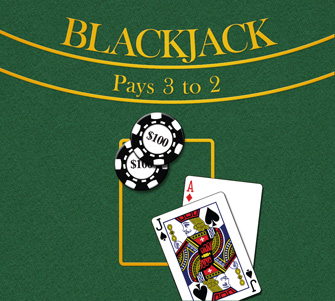Blackjack Decision Making
How and Why To Make Blackjack Decisions
Blackjack decision making depends on a lot of personal and environmental factors. For instance, how and why to make blackjack decisions can be influenced by personal factors like your bank roll, the amount of time you have to play, or your overall blackjack skills. Or your decisions can be influenced by your gaming environment, such as the number of players at your table, the number of card decks the casino is using for its blackjack games and the management style of your casino's pit boss.
The great thing about decision making in blackjack is that it can pay off. When you play blackjack "the right way", the game has one of the lowest house edges in the casino. So if you're the type who wants to take the time to learn how to make blackjack decisions best, then you'll see your game improve and it will save you money at the blackjack table. With that in mind, here are a few areas of interest when making blackjack decisions.
Blackjack Bank Roll
Managing your bank roll in blackjack is important, just like it is in any casino game. Remember that a bankroll is not all the money you own, or even all the money in your pocket. A bankroll should be the disposable income you set aside for gambling. If you're a not-so-serious blackjack player, then you should look at your bankroll as the money you have set aside for your amusement. It's your entertainment dollar, and the money should be viewed as the cost of buying personal entertainment. You might walk away from the blackjack table with an extra pile of money; but if you don't, then you still have more than enough to buy a hotel room, a meal and a tank of gas to get you home. You won't be missing rent by losing your bankroll.
If you're a serious player who comes to the casino to win some money, then your blackjack bankroll might be a stash you've built up from your casino winnings. This is money you keep separate from your spending cash and even your disposable cash. You keep track of every penny, and might even have a game journal to help you do so. In either case, a bankroll should always be money you can comfortably lose.
No matter what the size of your bankroll, any given hand should only expose a fraction of your bankroll to loss. Generally, if you plan on playing for an afternoon or evening, you should consider betting only about 1% to 5% of your bankroll per hand. For instance, if you want to bet $5 per hand, you should have a $500 bankroll. This allows you to bet (and lose) 20 hands per hour for up to five hours. You might end up betting 5% of your bankroll on a hand, but given that you expect to win back a certain percentage of your money, $500 should last you most of the afternoon when betting around $5. If you don't feel comfortable risking that amount, then consider smaller bets.
A professional player should probably have a minimum of a $10,000 bankroll, or else it's not going to be worth the player's time to play and win. Just remember, though, your blackjack bank roll should be something you can afford.
Blackjack Table Selection
 Blackjack hands are played fairly quickly compared to games like roulette, so your blackjack decisions need to be made relatively quickly. If you play at a "full" blackjack table, this has a few advantages and disadvantages. For one, if you sit towards the middle or right side of the table, you'll see a few more cards before you make your decisions to hit or stand. That's good for the card counters. Also, if you're still learning the game, you'll have a little more time to run through the blackjack basic strategy, so you might be more likely to make the right decisions.
Blackjack hands are played fairly quickly compared to games like roulette, so your blackjack decisions need to be made relatively quickly. If you play at a "full" blackjack table, this has a few advantages and disadvantages. For one, if you sit towards the middle or right side of the table, you'll see a few more cards before you make your decisions to hit or stand. That's good for the card counters. Also, if you're still learning the game, you'll have a little more time to run through the blackjack basic strategy, so you might be more likely to make the right decisions.
At the same time, more players means the hands will take longer. If you feel like the game is to your advantage, then less hands per hour means less chances to win. On the other hand, players who have no way of limiting the house edge should want to play less hands per hour, since you can expect to lose less money while you're playing. If you are getting comps of any kind for playing blackjack by the hour, then you'll want to play at a slower pace.
Blackjack Table Limits
Another important blackjack decision when selecting a blackjack table is to find one with the proper betting limits. You don't want a table with a minimum limit higher than you are comfortable playing. Generally speaking, you should stick to a table with limits that aren't higher than 5% of your bankroll. If you find a table that fits your other needs, but has a higher minimum limit than 5% of your bankroll, simply continue searching for a good table.
Basic Strategy Decisions
Basic strategy is "the book" in blackjack. Over the years, blackjack players have used computers to determine the odds on each and every hand combination (vs. dealer up-cards) in blackjack. Basic strategy is a chart or list which tells players the plays to make.
Beginning blackjack players need to learn basic strategy. Though basic blackjack strategy looks complicated at first, it really doesn't take that long to memorize. Learning these moves will help your blackjack decision making instantly, because it will teach you how and why you make the blackjack decisions you make. Once you know which moves give you the best odds, most of your blackjack decisions become simpler.
Blackjack Card Counting
Finally, if you want to delve into advanced blackjack decision making, you might eventually start to learn to count cards. I wouldn't do so until I have mastered basic strategy to the point that I know the correct plays by instinct, because card counting requires you to concentrate on the cards the dealer has dealt to you, the other players and himself.
Card counting is used to calculate the odds of what the next card will be. It keeps track of the high cards and low cards that have been played. When more high cards have been played, this changes the expectation you have of receiving a high card on your next draw. If more low cards have been played, your expectations change in another direction. Card counters modify the size of their blackjack bets according to these odds, betting more when the odds are in their favor and less when the odds are not in your favor.
This is where your gaming environment becomes important to the "how and why" of your blackjack decisions. If you are at a larger table, you'll see more cards per hand, and the dealer is less likely to pay attention to your card counting. Also, if the casino management or pit boss is not as attentive, you won't get noticed as much. When a player increases their bets consistently when the card count is in their favor, the dealer or pit boss is expected to notice this. If they do, the casino management might have the dealer shuffle the deck more often -- perhaps every hand -- thereby ending your card counting advantage.
Blackjack Factors
As you see, there are a hundred different factors which affect your blackjack decision making. Your bankroll might affect how aggressive you are, or how many options you have when betting. If you're a card counter, you'll need the bankroll to be able to increase your bets really high at certain points of the game. You'll need to learn how to select the best blackjack table, if you are interested in any kind of serious blackjack gaming. But if you want to make good blackjack decisions, basic strategy will be the foundation of how you make your blackjack decisions.
See also:


 Cherry Jackpot
Cherry Jackpot


